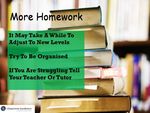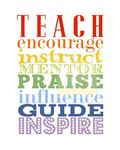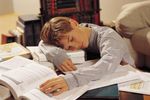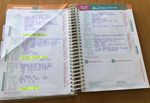Presentation Secondary School 1st Year Information Night 2019/2020 "Our Best, Always" - Presentation Secondary ...
←
→
Page content transcription
If your browser does not render page correctly, please read the page content below
Principal – Mr William Ryan
Deputy Principal – Ms Mary Dooley
Deputy Principal – Ms Caroline Ryan
Guidance Dept. – Ms. B Kavanagh
Mr D Nugent.
Special Education Team - Ms. M Curran,
Ms. R Stenning, Ms. A Carr, Ms. T
Bradshaw, Ms. E Sunderland
Year Head – Ms. V Whelan1st Year Classes Year Head – Ms. V Whelan Base classes and tutors Rang Aoife – Mr. S Gaynor Rang Brigid – Ms. R Stenning Rang Cliodhna– Ms. D Leacy ( Mr. C Doyle) Rang Deirdre– Mr. J Rolston Rang Etain – Ms. L Mahon
SCHOOL BUILD
DUE TO EVER INCREASING
NUMBERS THE SCHOOL WILL
BE BUILDING NEW FACILITIES
TO START SOON.
A NEW SCIENCE LAB AND PREP
ROOM
2 NEW CLASSROOMSEnvironment of Care, Growth, and
Belonging
Tutor
Year Head
Meitheal Leaders
Student Council
Parents’ Council
Guidance Counsellors
Learning Support/Resource
Anti-Bullying Policy
Code of Behaviour
Journal
UniformExtra Curricular Activities Basketball Handball Football Athletics Camogie Equestrian Outdoor Pursuits Days Deep Green Computer Club Couch to 5K club Games Club Library Club Feminist Society Drama Exchanges Creative Writing Club Senior and Junior Choir Liturgical services Positivity Group
POSITIVE RE-INFORCEMENT
Online system
Vsware
Parental access
Behaviour
Attendance
Reports
Well done cardsCreating the Right Environment
Partnership
School
Student
Home
Wider Community
We want our school to be the best school in
which to learn, to play, and to grow
Academic excellence and achievement is high
on the school’s agenda & School FocusBalance
STUDENT’S RESPONSIBILITY
We want each student to receive a Holistic
Education.
We want you to be:
Be ambitious
Always do your best
Have respect for people and property
Be prepared
Be in school every day – attendance and
punctuality are crucial
Abide by the Code of BehaviourHuge Change A lot more subjects A lot more teachers A lot more peers/people to deal with Bus All happening at a time when adolescence is starting to kick in
TRANSITION FROM PRIMARY TO SECONDARY SCHOOL
Triple transition:
From very familiar school environment to much
larger school and new subjects;
From one set of peer group and friends to another
peer group;
From childhood to adolescence.FROM ONE SCHOOL ENVIRONMENT TO ANOTHER Physical effort of carrying copies & heavier bags Mental exhaustion of new and varied subjects Lockers can cause stress. Different homework expectations. Focus on exams (particularly from 2nd year on)
PARENT/GUARDIAN RESPONSIBILITY We have a very good working relationships between our parents and the school. Please do not hesitate in making contact. It is a big change from Primary to Secondary School. If in doubt at all, please make contact. The sooner we know about issues the better Some advice tips for parents of new 1st years. Help , Support ,Encourage, Protect, Set Boundaries Be vigilant
ATTENDANCE
Pupils must have regular attendance. If you know that your daughter will not be
coming into school, please telephone the school immediately and give explanation
for her absence.
If a student misses 20 days in a school year the school is obliged to contact the
Education Welfare Officer.
If your daughter is not marked present, and we have not be notified, an automatic
text message will be sent.
Holidays should not be arranged during the school year.
Students should be punctual and if late a note of explanation should be written in
the school journal.
Students may not leave the school during the day without a note from their
parent/guardian and the permission of the Tutor.MS MARY DOOLEY Deputy Principal to First Years 2019/2020
LIVING A BALANCED LIFEST YLE
ORGANISED ROUTINE: ALLOW TIME FOR EVERY THING.
Sleep: 7/8 hours per night
Diet: Healthy and balanced
Exercise: Sports/ walking/
swimming
Part-time work: Keep to a minimum: e.g.
Saturdays (few hours). Not during the
week or Sunday nights or none at all.
Social life: Not during the week or
Sunday nights.LIVING A BALANCED LIFEST YLE
Each Student is unique and needs to develop a
balance that works for them regarding school life,
study and their life worldROLE OF PARENTS Motivate- Encourage, Recognize Progress, Reward. Monitor- Take interest, Check, Talk to other parents, P.T. Meetings, Take exam results seriously. Try to be aware: Of what’s going on in school re: tests, work etc.
SIGNS OF STRESS
Try to be aware of SIGNS OF STRESS
-Tiredness
-Irritability
-Too much or too little
sleep
-Negative talk
-Lowering of ambition
-Change in Appetite
-Lack of concentrationSIGNS TO WATCH FOR….
Avoidance Excuses for not studying
-“I have no work to do”
-Regular patterns of sickness
and absence from schoolBUSINESS OF SCHOOL DAY Attendance and Punctuality Code of Behaviour Ladder of Referral Illness – Going Home Medication Appointments School Journal –Notes/Communication
Please make sure that we have correct phone numbers and contact details for you. Please regularly check your childs journal All students must be collected if going home early or sick. With a signed note where possible. Permission slips for any outing or trip must be signed Please encourage your child to put away phones and other devices at night before bedtime.
MOBILE PHONES These may only be used at break time & lunch time. The phone should be used for essential calls and should be locked in the locker. Failure to observe these guidelines will result in the confiscation of the phone for one day. Mobile phones may not be used for taking photographs. No exception to the rule.
MS CAROLINE RYAN Deputy Principal
THE CLASS TUTOR Each class has a Class Tutor - a teacher who will meet them each morning for the assembly period for 8 minutes. This constant contact means that new students have a person in the school with whom they have contact each day and to whom they can talk if there is any problem with which they need help.
THE YEAR HEAD Each year group has a Year Head Teacher who has overall responsibility for the year group. They deal with pastoral and behaviour issues in the year and have a great deal of contact with the students. We also have an attendance of ficer with special responsibility for attendance. If there is any dif ficulty with attendance or a student requires a prolonged absence from school - the attendance of ficer should be informed by note.
THE MEITHEAL MENTOR SCHEME We have a student mentoring programme in Presentation Wexford where three students from sixth year meet with new first year students in small groups, at lunchtime, once a week for the first months of the year. It is an excellent opportunity for first year students to get to know some of the older students and to ask for their advice on issues. The small group structure of the meetings allows students to get to know other first years in a structured environment.
LOCKERS Each student will receive a locker in the school. Lockers will be allocated at the start of the academic year. We recommend that students leave any valuables they have in the locker. You will be aware, from the Behaviour Code, that mobile phones must be switched of f on arrival at school. Students should also use the lockers as much as possible for their books as this cuts down on the considerable weight of the bags. Students should get into the habit of going to lockers at break times to gather the books for the classes in the next session as students are not allowed to go to lockers between classes.
CODE OF BEHAVIOUR
Good discipline in the school is required to create an
atmosphere where each student feels secure and is
taught to accept responsibility for her actions.
In co-operation with parents the school is committed
to working to build a sense of pride in the school and
to foster respect for the whole school community.
Expectation + Sanctions = CODE
Code is signed by student and parent(s)
Detention – Lunchtime/ Evening Time
In School and Out of School SuspensionsBEHAVIOUR School is a community and all must act together to make it work successfully. To further this all members of the school community should be treated with courtesy and respect. Smoking is not permitted on the school premises or at any time while in school uniform. Any pupil under the influence of or in possession of alcohol or drugs will merit immediate suspension.
Persistent of fences may be punished by detention. Other of fences may be dealt with by the tutor and dean.
CODE OF DISCIPLINE PROMOTES..
In a SAFE AND
CARING
ENVIRONMENTPARENT MORNING
• Opportunity for parents/guardians to come into the school
and see the type of work your child is engaged in in school.
• Stands for dif ferent subjects and extra -curricular activities
– manned by first year students.
• Chance to catch up with other parents and meet some first
year teachers informally over a cup of tea.
Friday 18th October 11:30-12:30Guidance Department MR D NUGENT & MS B KAVANAGH,
“Our Best, Always”
Students
as
LearnersPLAN IT…. DO IT…. REVISE IT…
Homework Issues for 1st year
• 10 subjects
• Catching up if absent
• Recording homework
• Planning of homework
• Homework at weekend
• All forms of homework
are important
• Time management at
homeWhat the experts- the students say! Students who seem to achieve their best stated: • “My mam checks my homework and sometimes asks me questions” • “My dad helps test me after I have done my learning homework” • “I am not allowed to go online until I have done all my homework” • “I do it early..” • At weekend --I always do my homework when I come home ….I never leave it until Sunday night”
What students say! Students who struggle to achieve their best stated: • “I leave my homework until around 8.00pm after I have relaxed, watched TV and spent time online... I have no planned time to do weekend homework.. it varies ..but mainly Sunday night. • “I am allowed one hour online before I do my homework” • “When I go to bed I spend an hour or so online using my phone ” • “My parents don’t check my homework” • “we don’t get much except when we have tests” • “I learn only for tests”
Learning at Home be organised & have a routine Plan it .. When.. Where.. How.. Do it …. Stay on task Revise it…. Remember it
HOMEWORK
• WRITTEN
• ORAL
• LEARNING – TO REMEMBER
• REVISION-going back to learn again for a test- “OVER
LEARN”SCHOOL JOURNAL
• Always have it with you
• Key to success
• Not private
• Subjects written in
advance
• Record every class
• Students encouraged to
use code (W) (L) (R)
(O)
• ‘Homework Buddies’
• Indicate time taken
• Parents monitor & check
EACH NIGHT
• sign once a weekSTUDENT JOURNAL SUBJECT HOMEWORK DATE Done Monday French learn(L) verb / (W) pg21 Q1-3 Maths pg 4 Q5-10 (W) Bus pg 25 (L) key points Geog Free Class Rel paragraph pg 7 (W) Drama word games Home Ec ingredients for scones(P) /pg 10 ,11,(L) SPHE My talents English Test
THE FIRST STEP!
1st YEAR HOMEWORK CHART (Homework & study) TIME MON TUES WED THURS FRI Time SAT SUN 3.30pm- 4.30pm basketball Free Free Free 4.30pm Homewor 5pm Free basketball homework Homework Free 11am k 5pm - Finish/ 5.30pm Homework Free Dance Homework Homework pack bag 5.30pm- 6pm Dinner Dinner Dance Dinner Homework 2pm town 6pm- 6.30pm T.V Homework Dinner Homework Dinner town 6.30pm- 7pm Homework Homework Homework Homework Homework town 7pm- Finish/ pack 7.30pm Homework Homework Homework bag Free 7.30pm- Finish/pack revise for Finish/ 8pm bag test pack bag Free Free 8pm- 8.30pm T.V Free Free Free Free 8.30pm- 9pm Free Free Free Free Free 9pm- 9.30pm
CREATE A LEARNING -FRIENDLY
ENVIRONMENT
Same place if possible every night
Quiet room
Table and chair
Good lighting
Not too comfortable
Background music?
Eliminate distractions-phones!!!!!
They do not need the internet to complete most of their homeHomework Routine
• Have a routine-
• Do on the night it is given
• Do favourite subject first
• Do difficult subject next.
• Keep easy /enjoy subject to
end
• Mix type of subjects
• Mix activities –don’t do all
written first then all learning
• Packing bag for next day part
of homeworkI REMEMBER… 10% OF WHAT I READ 20% OF WHAT I HEAR 30% 0F WHAT I SEE PASSIVE 50% OF WHAT I HEAR & SEE LEARNING 70% OF WHAT I P WRITE & SAY 90% OF WHAT I DO ACTIVE LEARNING 95% OF WHAT I TEACH TO OTHERS W. Glasser
Learning to Learn-‘POKER’
1. Pre-test(what do I know?)
2. Overview -read-scan(what is Active –
reading/’looking over’
this about?)
is not learning!
3. Key words+key diagrams
4. Etch & Sketch -make
notes/mind maps/flash
cards =be active!
5. Retest-write /hear/ draw
Check/circle mistakesCoping with Tests
• Coping with anxiety
• Set realistic targets
• Avoid ‘cramming’
• Do a little –often
• Make out own notes
• Train memory
• Practice recall by
self testing-write it
down!Parents Role
• Stay involved-monitor-negotiate & advise
• Encourage doing their best / organisation for
school
• Check & monitor
School journal
Learning environment at home
How they manage their time
Learning and self testing
Presentation of work
Eating patterns & habits• Track Progress in school- test results/v s ware • Subject Level –to do their best • Monitor school work at home • Focus on the positive- effort, developing skills, move from dependence to independence • ASK! • Gradual move to personal responsibility & own homework space. • ‘Homework & Study Skills Workshop’ Jan 2020-
Parents Council
Our Standards Happy students and staff Caring and supportive towards each other Support High quality learning High personal standards Christian ethos Respect and manners Care and support High quality teaching High standards of behaviour Positive Reinforcement Homework Prefects and leadership Professionalism and respect
The Experience of First Years
1. What has been the hardest thing about the change
from Primary to Secondary School?
“Leaving my old friends and going from a
small school to a bigger school” “LoNgEr DaYs”
“The homework, the new school, the new
friends (and the people you don't really click
“The weight of the school bag” with) and the lockers.”
“the hardest thing was the first day I was so nervous but after
and hour I felt so comfortable there hasn't been anything to
hard :) I love this school”
“the tests are a lot harder and more frequent”
“The teachers expect too much from you :( We're only in first year
and we get well too much homework :(“
Time for TransitionThe Experience of First Years
2. What has been the best experience for you so far
in the school?
“The best experience is meeting new friends and the
Meitheal group is nice too and gets the class closer.”
“I really liked induction days and my iPad”
Meithea l:
means 'a collective effort for the greater
“Making my new best friends, trying out all good of the community'.
the different subjects we never had in
primary school e.g. business, art and home “Meeting new friends and people,,
economics” basketball, the online safety talk, camogie
blitz, the choir, basketball”
“Just being in the school and being accepted
here”
“I have enjoyed every minute and I hope it stays that way!”
Time for TransitionFears and worries will decrease with time “I worried I won’t have any friends in my class.” “I worried my old friends will act differently.” “I worried because everybody else will be bigger.” “I worried I will be crushed.” “I worried about being organised.” “I worried about being late for class.” “I worried about not knowing where to go.” “I worried about teachers being too strict.” “I worried about the content of the new subjects.” We are here to help in any way possible
FINAL HINTS Use the school journal If there are problems contact the Teacher, Tutor or Year Head. Information may be found on the School website principals page and much more. Follow us on twitter, facebook, instagram Encourage your daughter to get involved in as many school activities as possible.
QUESTIONS AND ANSWERS THANK YOU FOR YOUR TIME, PATIENCE & ENGAGEMENT .
You can also read



























































